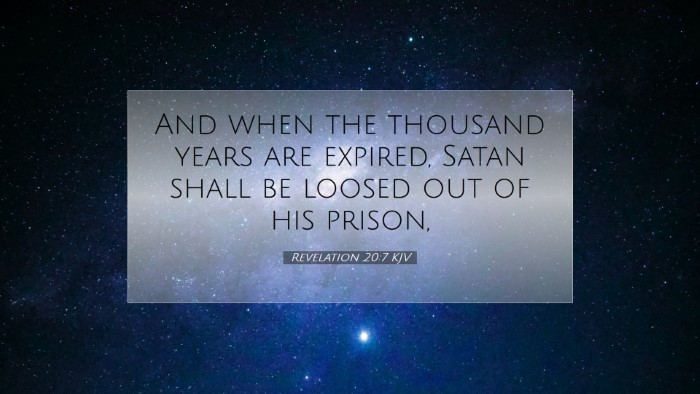Commentary on Revelation 20:7
Revelation 20:7 states: "And when the thousand years are expired, Satan shall be loosed out of his prison." This verse marks a significant transition in the eschatological narrative of the Book of Revelation, emphasizing the ultimate conflict between good and evil. The interpretation of this verse has generated considerable theological discourse, offering insights into the nature of evil, divine sovereignty, and the ultimate reconciliation of creation.
Overview of the Context
This verse occurs within the broader context of Revelation 20, which describes the Millennium—a period of Christ's reign on earth. Prior to this passage, John has depicted the binding of Satan and the reign of the saints, an event signifying the triumph of Christ over evil. The release of Satan after this period serves as a crucial moment for understanding final judgment and the fate of humanity.
Theological Significance
The release of Satan from his confinement raises significant theological questions. It emphasizes that evil, although restrained, is not abolished. This serves to remind believers of the pervasiveness of sin and the continual need for vigilance. Matthew Henry points out that the temporary release of Satan is a test for those who lived in the blessed reign of Christ, challenging them to remain faithful despite renewed temptation.
The Nature of Evil
The symbolism of Satan's release illustrates the persistent reality of evil in a fallen world. Albert Barnes highlights that this period serves to show that while Christ holds ultimate power, the existence of evil is not nullified until the final judgment. It serves as a sobering reminder that humanity must navigate a world where both divine authority and satanic opposition coexist.
Testing of the Saints
The raising of Satan after the Millennium suggests a time of testing for the saints. Adam Clarke elaborates that the trial of believers in this period highlights the sovereignty and righteousness of God. God permits this final testing to demonstrate the fidelity of His followers, allowing them to reaffirm their allegiance to Him despite tribulation.
Interpretative Frameworks
Revelation 20:7 is often examined through various eschatological frameworks: premillennialism, amillennialism, and postmillennialism. Each framework offers differing interpretations regarding the timing and nature of Christ's reign and Satan’s activity.
-
Premillennialism: This view holds that Christ will physically reign on earth for a thousand years before the final judgment. Proponents argue that Satan’s release is part of God’s ultimate plan to expose the hearts of people, revealing that even after a period of peace, rebellion can still arise.
-
Amillennialism: Amillennialists interpret the Millennium as a symbolic reign of Christ, present in the Church age. In this context, Satan's release indicates sporadic moments of evil that the Church will face until Christ’s final victory. This perspective emphasizes the Church's ongoing battle against spiritual forces.
-
Postmillennialism: This view maintains that the world will gradually become more Christianized, leading to Christ’s return. The final release of Satan serves as a contrasting moment against a backdrop of an increasingly righteous world, emphasizing humanity's propensity to sin even amidst divine favor.
Final Judgment and Hope
Ultimately, Revelation 20:7 culminates in the powerful assertion of God’s sovereignty over history. The loosing of Satan is a necessary precursor to the ultimate judgment, where evil will be completely defeated. The finality of God’s plan reassures believers of their victory over sin and death. As noted by Barnes, the narrative leads to an assurance of resurrection and eternal life for the faithful, highlighting the eternal nature of God’s promise to His followers.
Practical Application
Revelation 20:7 calls Christians to be proactive in their faith, reminding them of the spiritual warfare that continues even during periods of peace and prosperity. The teachings derived from this verse encourage believers to remain steadfast, rooted in Scripture, and vigilant against the influences of evil.
Encouragement in Trials
For pastors and spiritual leaders, this verse serves as a source of encouragement for their congregations. Teaching that trials are inevitable can help prepare believers for the challenges that arise from both within and outside the Church. Clarke emphasizes the importance of spiritual preparedness, advocating for a close relationship with God through prayer and Scripture.
Hope and Assurance
The promise of final victory over Satan provides hope to believers. While challenges might be daunting, the assurance of Christ’s ultimate triumph can instill a sense of peace. Pastors are encouraged to preach the message of hope found in Christ, highlighting the dichotomy of struggle and victory present in the Christian walk.
Conclusion
In summary, Revelation 20:7 transcends its immediate context, inviting deeper reflection on the interplay between evil and divine authority. By synthesizing insights from Matthew Henry, Albert Barnes, and Adam Clarke, we gain a richer understanding of the enduring truth of God’s sovereignty and the ultimate hope offered to believers. It is a reminder of the continuous battle against sin and the final promise of redemption for those who remain steadfast in their faith. As we navigate our spiritual journeys, let us remain vigilant and hopeful, recognizing that even in trials, we are assured of final victory in Christ.


